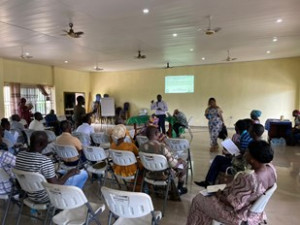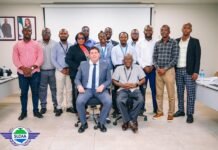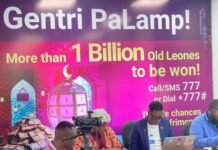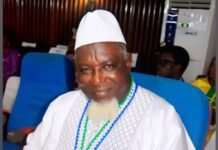By Foday Moriba Conteh
As part of their efforts to broaden citizens’ understanding of the mandate of the Tripartite Committee on Electoral Reforms and the work done so far, the Centre for Accountability and Rule of Law-Sierra Leone (CARL-SL), with funds from the Open Society Foundation (OSF), has conducted Regional Stakeholder Engagements. These engagements aimed to discuss the Committee’s mandate and progress.
The Regional Stakeholder Engagement for the Eastern Region was held on Tuesday, June 25, 2024, at the Kenema District Council Hall in Kenema District. The Southern Region’s engagement took place the following day, Wednesday, June 26, 2024, at the Bo District Council Hall in Bo District.
In his presentation in both Kenema and Bo Districts, Jeremy Ben Simbo, Head of Programs at the Centre for Accountability and Rule of Law-Sierra Leone (CARL-SL), explained that following the June 24, 2023 elections in Sierra Leone, a political impasse arose between the two main political parties, the All-People’s Congress (APC) and the Sierra Leone People’s Party (SLPP).
He continued that the APC was dissatisfied with what they perceived as inaccurate results of the Presidential, Parliamentary, and Local Council elections announced by the Electoral Commissioner.
As a result, he informed, the APC decided not to participate in any form of governance and instructed their elected members not to take their seats in Parliament and the Councils until the ECSL released the disaggregated results for every polling station.
Jeremy Ben Simbo informed participants that in response, with technical and financial support from development partners like ECOWAS, the African Union and the Commonwealth, the Peace and Independent Commission for Peace and National Cohesion Sierra Leone facilitated a three-day dialogue between the SLPP and the APC adding that on October 18, 2023, leaders from both parties signed a communiqué, symbolizing an agreement and resolution in the interest of peace and national cohesion.
He said that the communiqué included several key resolutions: the President was to make a national address on dialogue, unity, cohesion, and peace; the APC agreed to end its non-participation in governance; and a cross-party Committee on Electoral Systems and Management Bodies Review was to be constituted with leadership nominated by the Government of Sierra Leone, the APC, and Development Partners.
According to him the Committee’s mandate is to examine the electoral systems, structures, and processes of the 2023 multitier electoral cycle, informed by previous elections, with a view to enhancing the credibility of future elections in Sierra Leone.
Jeremy Ben Simbo detailed that the Committee would address contentious issues of elections and result management, including the collation, verification, authentication and publishing of electoral data consistent with international best practices.
He also informed how the Terms of Reference were developed within 30 days, and the Committee’s duration was set for six months, although it has since been extended. Pointing out that the Committee is gender-balanced he underscored that its recommendations are to be actionable and implementable.
He pointed out that further resolutions included the release of individuals arrested for election-related offenses, discontinuation of politically motivated court cases against APC supporters, and support for the resettlement of displaced political party supporters.
According to him, upon assumption of their governance positions, elected APC officials were to have their entitlements addressed by the appropriate institutions.
He intimated how the dialogue also agreed on institutionalizing an inter-party framework and condemned incitement to violence and hate speech.
“Moral guarantors were established to oversee the implementation of the national unity agreement,” Jeremy Ben Simbo stated.
Commenting on the progress, he noted that significant steps had been taken over the past six months, including the development of key documents, outreach activities with stakeholders and engagement with international experts.
He said the Committee’s work has focused on electoral management, institutional and legal reforms adding that the final stages are now underway, with a comprehensive report to be presented to the President of Sierra Leone.
Jeremy Ben Simbo ended up expressing gratitude to development partners, experts and moral guarantors who supported the process, urging all stakeholders and citizens to maintain peace and support crucial electoral reforms that will shape the future of Sierra Leone’s democracy.
In Bo, the Regional Secretary South of the All-People’s Congress, Hon. Legacy Sankoh, expressed appreciation to the Centre for Accountability and Rule of Law-Sierra Leone (CARL-SL) for the Regional Stakeholder Engagements on the mandate of the Tripartite Committee on Electoral Reforms in the country.
He said that the All-People’s Congress is happy to participate in the engagement and share their ideas on the work and the mandate of the Tripartite Committee on Electoral Reforms and the work done so far by the Committee.
The Regional Secretary South of the Sierra Leone People’s Party (SLPP), Francis Massaquoi, said that after the end of elections the country should think about the development adding that for far too long the country would have progressed.
He commended CARL-SL for the Regional Stakeholder Engagements on the mandate of the Tripartite Committee on Electoral Reforms saying it is very key stressing how such would have been done long before in order to give citizens a better understanding on the mandate of the Tripartite Committee on Electoral Reforms in the country.
The Deputy Director & Head of Office, Southern Region, Human Rights Commission Sierra Leone, Emmanuel Thomas, said that following the June 24, 2023 elections in Sierra Leone, a political impasse arose between the two main political parties, the All-People’s Congress (APC) and the Sierra Leone People’s Party (SLPP), which saw the establishment of the Tripartite Committee in order to reform the country’s electoral systems.
He said that the 2023 general elections and previous elections have been challenged on the premise of lack of transparency and credibility of which he said that there is a dire need for collective actions to address those challenges going forward.
Key stakeholders in Kenema also made statements during the engagement.
As part of engagement participants engaged in group work and made presentations followed by open discussions and general feedback.





